

PeerScholar. PRAZE : Learning Management System : The University of Melbourne. PRAZE is an anonymous web-based peer review system that automates and manages the peer assessment process.
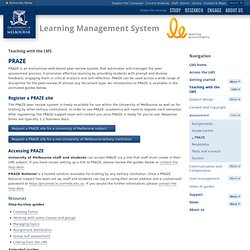
It promotes effective learning by providing students with prompt and diverse feedback, engaging them in critical analysis and self-reflection. PRAZE can be used across a wide range of disciplines for the peer-review of almost any document type. An introduction to PRAZE is available in the animated guides below. Register a PRAZE site The PRAZE peer review system is freely available for use within the University of Melbourne as well as for trialling by other tertiary institutions. Request a PRAZE site for a University of Melbourne subject Request a PRAZE site for a non-University of Melbourne tertiary institution Accessing PRAZE University of Melbourne staff and students can access PRAZE via a link that staff must create in their LMS subject. PRAZE National is a hosted solution available for trialling by any tertiary institution.
Resources. Peer Review. Students don't just learn from instructors, they also learn from one another.
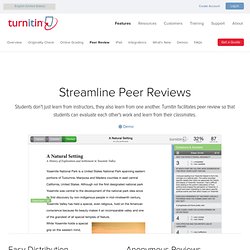
Turnitin facilitates peer review so that students can evaluate each other's work and learn from their classmates. Demo Easy Distribution Distribute work online to allow peers to review each other's work anytime. It's easy and efficient even for the largest classes. Anonymous Reviews Customize the peer review process to fit the workflow of your classroom through options such as anonymous peer reviews. Standard or Custom Assessment Questions Ensure students stay on track and provide the right kind of feedback with standard or customized assessment questions.
Improve Critical Thinking Develop students' critical thinking skills and empower them to share and help other students in the classroom. View One Comprehensive Report 24/7 Access from a Web Browser Turnitin is completely online and available anytime through a standard web browser. Peerreview. Falchikov and Goldfinch - Student Peer Assessment Meta-Analysis. Peer assessment and review. What’s important about peer assessment and review?
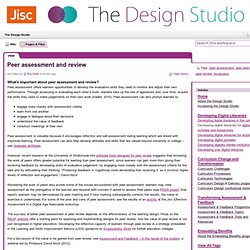
Peer assessment offers learners opportunities to develop the evaluative skills they need to monitor and adjust their own performance. Through assessing or evaluating each other’s work, learners take up the role of appraisers and, over time, acquire the skills they need to make judgements on their own work (Sadler, 2010). How do I get started with peer assessment? - Peer assessment - Engage in Assessment. Admin.exeter.ac.uk/academic/tls/tqa/Part 5/5Dpeerassess1.pdf. Why should I use peer assessment? - Peer assessment - Engage in assessment. There are a number of reasons why you may wish to use and/or further develop peer assessment in your modules.
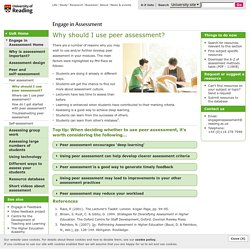
The main factors were highlighted by Phil Race as follows: Students are doing it already in different ways. Students will get the chance to find out more about assessment culture. Lecturers have less time to assess than before. Learning is enhanced when students have contributed to their marking criteria. Top tip: When deciding whether to use peer assessment, it's worth considering the following...
References Race, P. (2001). Peer assessment - Engage in Assessment. Online Self and Peer Assessment Software. Development of authoring software for peer and self assessment of text based exercises using the web as an interface Dr Richard Parsons University of Dundee Access the web-based program Instructions for using the program Guidance that can be provided to students for completing assessments File containing an introduction to the program and the instructions Self and peer assessment are two important techniques that can be used to learn a variety of skills that are important in the educational development of learners.
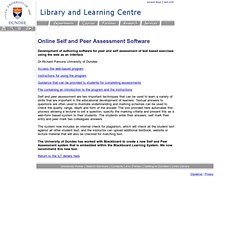
The system now includes an internal check for plagiarism, which will check all the student text against all other student text, and the instructor can upload additional textbook, website or lecture material that will also be checked for matching text. The University of Dundee has worked with Blackboard to create a new Self and Peer Assessment system that is embedded within the Blackboard Learning System. Return to the ILT details here. PEAR - Peer Evaluation, Assessment and Review. PEAR (Peer Evaluation, Assessment and Review) is an online peer review application, developed by Teaching Support Services (TSS) at the University of Guelph, which helps instructors facilitate the peer review process.
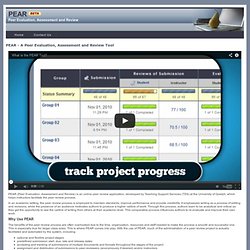
In an academic setting, the peer review process is employed to maintain standards, improve performance and provide credibility. It emphasizes writing as a process of editing and revisions, while the presence of an audience motivates authors to produce a higher calibre of work. Through this process, authors learn to be analytical and critical as they get the opportunity to see the calibre of writing from others at their academic level. This comparative process influences authors to re-evaluate and improve their own work. Why Use PEAR The benefits of the peer review process are often overlooked due to the time, organization, resources and staff needed to make the process a smooth and successful one.
Aropä. Aropä is a web-based system which supports peer review activities.
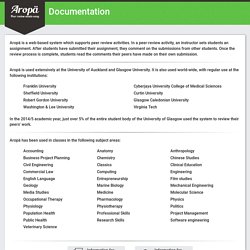
In a peer-review activity, an instructor sets students an assignment. After students have submitted their assignment, they comment on the submissions from other students. Once the review process is complete, students read the comments their peers have made on their own submission. Aropä is used extensively at the University of Auckland and Glasgow University. It is also used world-wide, with regular use at the following institutions: Franklin University Cyberjaya University College of Medical Sciences Sheffield University Curtin University Robert Gordon University Glasgow Caledonian University Washington & Lee University Virginia Tech In the 2014/5 academic year, just over 5% of the entire student body of the University of Glasgow used the system to review their peers' work.
Aropä has been used in classes in the following subject areas: Calibrated Peer Review: Home.